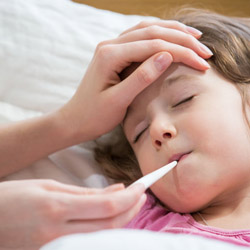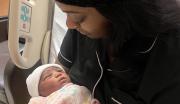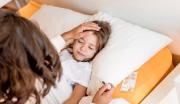
Respiratory Syncytial Virus, better known to parents as RSV, is a seasonal disease that is the cause of more pediatric hospital admissions this time of year than any other, according to Dr. Nickolas Dawlabani, Co-Chair of the Department of Pediatrics and Medical Director of Inpatient Pediatrics at Shore Medical Center. Seasonal in nature, RSV is common October through May, but the height of the season is January through March.
Dr. Dawlabani said that almost all children are infected with RSV at some point by the time they are two years old, and reinfection is common. However, he said RSV is not just a virus that affects children - it can be particularly troublesome to senior and immunosuppressed patients as well. Transmission of RSV is most commonly through direct contact but aerosol droplets such as from a sneeze are also to blame. RSV can survive for several hours on hands as well as on surfaces such as door knobs, desks and toys. The incubation period is four to six days according to Dr. Dawlabani.
RSV affects the bronchioles or the lower portion of the lungs and is the most common cause of lower respiratory tract infections or bronchiolitis in children under one year. Worldwide, RSV accounts for 42 percent of the hospitalizations of children under six months of age.
Bronchiolitis usually begins with symptoms of a regular cold. Children who get bronchiolitis start with a stuffy or runny nose, a mild cough, a fever over 100.4 degrees and a decreased appetite. As it drags on, parents may notice their child breathing very fast or having trouble breathing. In babies, the first sign can be a pause in breathing that can last 15-20 seconds. Finally, there may be a wheezing or whistling sound when they breathe, and the mild cough is now severe, often dragging on for two weeks and accompanied by a lack of interest in eating and drinking.
Information provided by Dr. Dawlabani indicates that RSV is capable of causing severe lower respiratory tract disease, bronchiolitis, bronchospasm, pneumonia and acute respiratory failure in children. Roughly 20 percent of infants develop RSV-associated wheezing before the age of one and 2 to 3 percent of them will require hospitalization. Apnea associated with infants hospitalized with RSV may be the cause of sudden unexpected death.
Dr. Dawlabani said that children are normally able to fight off RSV with supportive or comfort measures like rest, suctioning the mucus from the child’s nose, humidifiers, increased fluids and medication to reduce fever. Because it is a virus, it will resolve in a few days as long as there is no secondary infection.
“Parents will come in and request an antibiotic, but RSV is viral in nature, meaning antibiotics will not help, and the symptoms of the disease will go away in a few days. We do not like to over-prescribe antibiotics and if there is no other infection present it is not needed,” said Dr. Dawlabani. But he added, for those with other contributing conditions like congenital heart defects, premature birth, immunodeficiency or neurologic disease, they have a higher incidence of hospitalization. Infants exposed to second-hand smoke, diagnosed with asthma or who are in daycare are at a greater risk for contracting RSV.
The elderly are also at risk for contracting RSV. In fact, it is commonly one of the viruses monitored in senior housing and nursing facilities because of its very contagious nature. At risk along with the over-65 population are those who have underlying conditions such as chronic obstructive pulmonary disease, asthma, and immune deficiency. Wheezing is also a common symptom in this population, which is accompanied by shortness of breath. For those who are hospitalized, Dr. Dawlabani said supplemental oxygen is very helpful.
Minimizing RSV Transmission
Dr. Dawlabani said there are a few simple things parents and caretakers can do to minimize the risk of spreading RSV. These include:
- Frequent hand washing, either with soap and water or alcohol hand rubs
- Getting a flu shot every year
- Staying away from children and adults who may be sick.
Shore Medical Center’s state-of-the-art Pediatric Care Center is staffed 24/7 by pediatric hospitalists and pediatric nurse practitioners. Shore is affiliated with St. Christopher’s Hospital for Children in Philadelphia. To learn more, click here.










